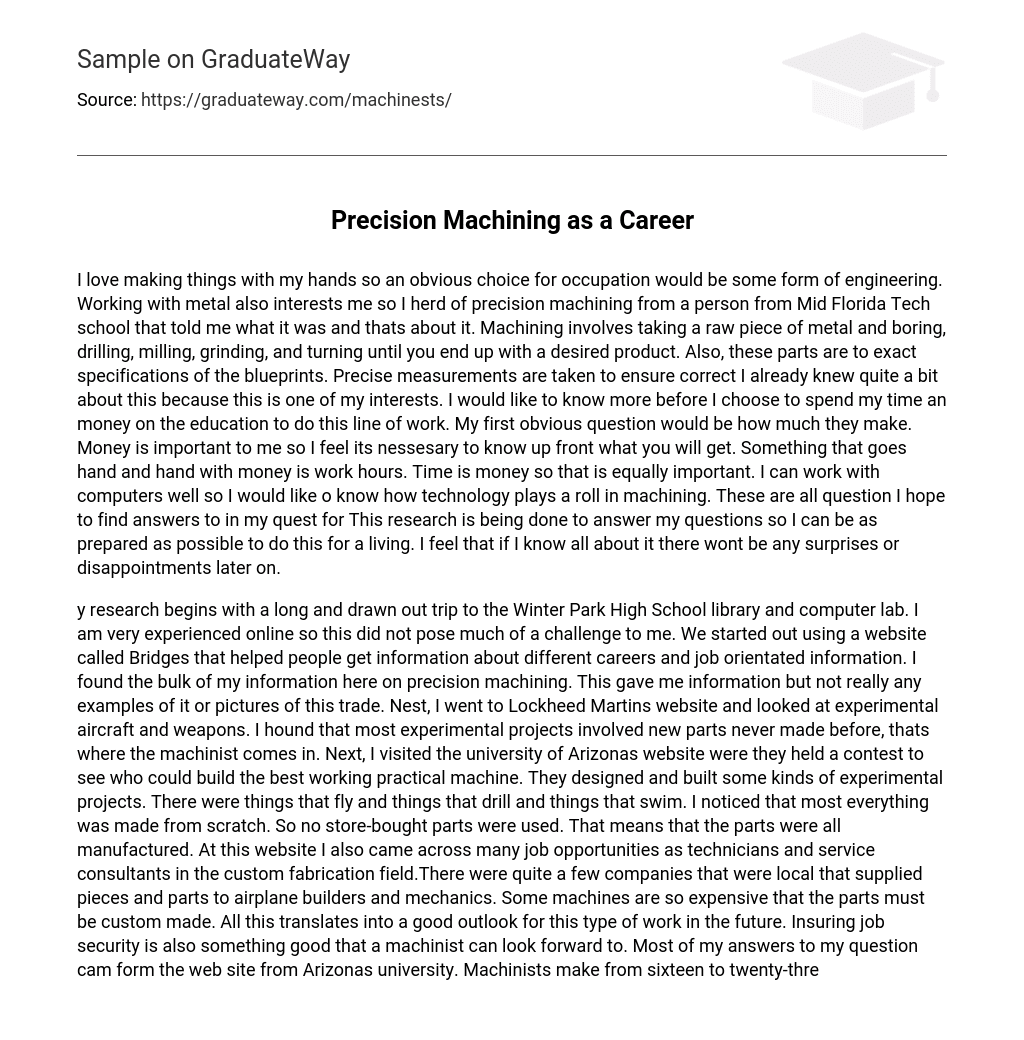I have a passion for hands-on craftsmanship, which naturally leads me to consider a career in engineering. The field of precision machining, which involves working with metals, particularly caught my attention after someone from Mid Florida Tech school introduced me to it. However, my knowledge about precision machining is limited at this point.
Machining entails manipulating a raw metal piece through processes such as boring, drilling, milling, grinding, and turning in order to achieve a desired product. Moreover, these parts are manufactured in strict accordance with the specifications outlined in the blueprints. Ensuring accuracy, precise measurements are taken. I already possessed some knowledge regarding this subject, as it is one of my interests. However, I wish to acquire further information before investing my time and money into pursuing education for this line of work.
My initial inquiry would revolve around their income. Since money holds significance for me, I consider it essential to be aware of the financial aspect upfront. Similarly, work hours go hand in hand with monetary compensation, making it equally crucial. Given my proficiency in computer work, I am keen to understand the role of technology in machining. These inquiries are all part of my quest to obtain answers so that I can adequately prepare for pursuing this profession.
In order to avoid future surprises or disappointments, I start my research by visiting the Winter Park High School library and computer lab. Despite my online experience, this task was not difficult for me. Initially, I utilize a website called Bridges to gather information about various careers and job-related details. The majority of my information on precision machining is obtained from this source. However, it lacks examples and visuals of this trade. Consequently, I then browse through Lockheed Martin’s website to explore experimental aircraft and weapons.
I found that in most experimental projects, new parts that had never been manufactured before were involved, and this is where the role of the machinist becomes crucial. Afterward, I explored the website of the University of Arizona, where they conducted a competition to determine who could construct the most effective and functional machine. They were engaged in designing and building various types of experimental projects, including flying, drilling, and swimming mechanisms.
I noticed that most everything was made from scratch, meaning that no store-bought parts were used. As a result, all the parts were manufactured. On this website, I also discovered numerous job opportunities as technicians and service consultants in the custom fabrication industry. Many local companies provided pieces and parts to airplane builders and mechanics. Since some machines are too costly, the parts must be specially made. All of this indicates a promising future for this line of work, ensuring job security for machinists.
The majority of the information I found regarding my question came from Arizona’s university website. Typically, machinists earn between sixteen and twenty-three dollars per hour, with higher earnings credited to experienced individuals. Fresh out of college, one can anticipate an average hourly wage of about eighteen dollars. Working hours follow a standard nine-to-five schedule, unless additional work is required. College attendance is necessary for a minimum of one year, typically at a vocational school such as Mid Florida Tech. In this field, technology is paramount as all robots are controlled by computers and operated by humans. While humans still give instructions to computers, the steady arm of a robot is advantageous when precision is crucial.
After conducting extensive research, I have reached several conclusions regarding my interests and career prospects. Particularly, precision machining has captured my fascination. Nevertheless, it is worth noting that I aspire for greater financial rewards than what precision machining can currently provide. Fortunately, there are occupations like mechanical engineering that offer higher salaries while requiring fewer hours of work. Consequently, I intend to investigate this alternative career path in my forthcoming research. Ultimately, I believe that finding satisfaction in one’s professional endeavors is crucial. Thus, I will carefully evaluate my priorities for the future. However, I must emphasize that I am genuinely considering precision machining as a viable career option.





